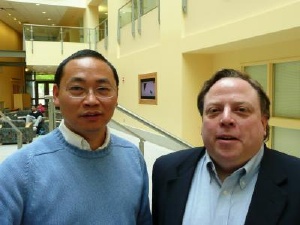May 10 2009
Two Boston College physicists have been awarded $2.1 million in "green energy" funding from the U.S. Department of Energy as part of a multi-university project to develop solid-state materials that transfer solar energy to electricity.
 Boston College Physics Professor Zhifeng Ren and Assistant Professor Cyril Opeil, SJ, will partner with colleagues from MIT and Oak Ridge National Laboratory through MIT's new Solid-State Solar-Thermal Energy Conversion Center -- known as S3TEC. Credit: Ed Hayward/Boston College
Boston College Physics Professor Zhifeng Ren and Assistant Professor Cyril Opeil, SJ, will partner with colleagues from MIT and Oak Ridge National Laboratory through MIT's new Solid-State Solar-Thermal Energy Conversion Center -- known as S3TEC. Credit: Ed Hayward/Boston College
Boston College Physics Prof. Zhifeng Ren and Asst. Prof. Cyril Opeil, SJ, will join researchers from MIT and Oak Ridge National Laboratory on the project. MIT was awarded $17.5 million to open the Solid-State Solar-Thermal Energy Conversion Center - known as S3TEC - one of 46 new Energy Frontier Research Centers (EFRCs) established by the US Department of Energy to accelerate the scientific breakthroughs needed to build a new 21st-century energy economy.
The EFRC funding will support Ren and Opeil's research as part of the new center and fund a post-doctoral researcher and four graduate assistants at BC.
Ren has worked closely with S3TEC director and MIT Prof. Gang Chen to develop pioneering nanotechnology capable of using thermoelectrics to harvest energy from waste heat. The center's research will focus on solar energy and man-made heat sources.
Thermoelectric technology could potentially reduce the cost of solar electricity generation to as little as five cents per watt, compared to current silicon-based photovoltaic solar cells, which cost $3-4 per watt.
"I am excited to be involved in research on 'green energy' resource technology for two reasons," Fr. Opeil said. "First, our country needs to decrease its dependence on fossil fuels so that we reduce the potential for conflict over limited reserves. Secondly, research of this type makes possible a more just and equitable distribution of energy resources throughout the world. The sun is the Creator's gift to everyone."
The U.S. Department of Energy's Office of Science received 260 proposals aimed at meeting the nation's most pressing energy needs and enhancing the country's energy security. The 46 EFRCs were selected following a review by outside panels of scientific experts.
"As global energy demand grows over this century, there is an urgent need to reduce our dependence on fossil fuels and imported oil and curtail greenhouse gas emissions," U.S. Secretary of Energy Steven Chu said when he announced the grants at a White House ceremony. "Meeting this challenge will require significant scientific advances. These Centers will mobilize the enormous talents and skills of our nation's scientific workforce in pursuit of the breakthroughs that are essential to make alternative and renewable energy truly viable as large-scale replacements for fossil fuels.